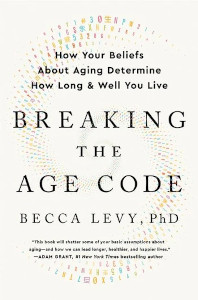Posted by Elena del Valle on January 19, 2023

Alice Nevers
Photo: Mhz Choice
Starting this month Alice Nevers, a 2019 French television series in French with English subtitles, will become available on Mhz Choice, a subscription streaming platform popular among audiences with a taste for international episodic programs and films. A screener of the first episode was provided by the streaming service.
The six episodes star Marine Delterme as Alice Nevers, an investigating judge and single mother returning from maternity leave, and Jean-Michel Tinivelli as Fred Marquand, her policeman partner. A Mad World, the first episode, centered on a mental health case, hints at a possible romance between the two colleagues. It was directed by Rene Manzor and produced by Ego Productions “with the participation of TF1.”
Posted by Elena del Valle on January 11, 2023

Breaking the Age Code by Becca Levy, Ph.D.
Photo: William Morrow
Becca Levy, Ph.D., professor of Epidemiology, Yale University, is convinced ageism affects the health and longevity of many, particularly in the United States where ageism is pervasive and absorbed from an early age. In Breaking the Age Code How Your Beliefs About Aging Determine How Long and Well You Live (William Morrow, $28.99), a 294-page hardcover book published in 2022 she outlines her thoughts on the subject. The book is divided into 10 chapters and four appendices.
In her book she describes four ways ageist principles become entrenched into our beliefs and guide our self dialogue and behavior before we reach old age; she explains some of her research findings and the conclusions she and others have drawn about the elders among us, including ways in which they surpass younger individuals; and proposes steps to address and halt the harmful effects ageist beliefs produce.
In the United States ageist thoughts have been identified in children as young as three, according to her book. Adopting ageist beliefs as children makes them part of a person’s long term stereotypes, she says, pointing to a study of Canadian and American teenagers who already see old people as “slow and confused.” In Chapter 1 she identifies three pathways ageism follows: psychological, behavioral and biological. Negative age beliefs, she says, can increase stress and that in turn might lead to an earlier death than in the absence of such beliefs.
Ageism combined with other prejudices and related behaviors, such as sexism and racism, for example, can aggravate existing conditions, she says in Chapter 8. In Appendix 1 she addresses ways readers might boost positive age beliefs; the following appendix examines structural ageism such as the exclusion of older people in clinical trials even when the trials are for illnesses that afflict mainly older adults. The author declined to respond to multiple email requests via her publisher to answer questions or be interviewed.
According to her bio Levy is also professor of Psychology at Yale University; she has testified before the United States Senate on “the adverse effects of ageism;” and “serves as a scientific adviser to the World Health Organization’s Campaign to Combat Ageism.











